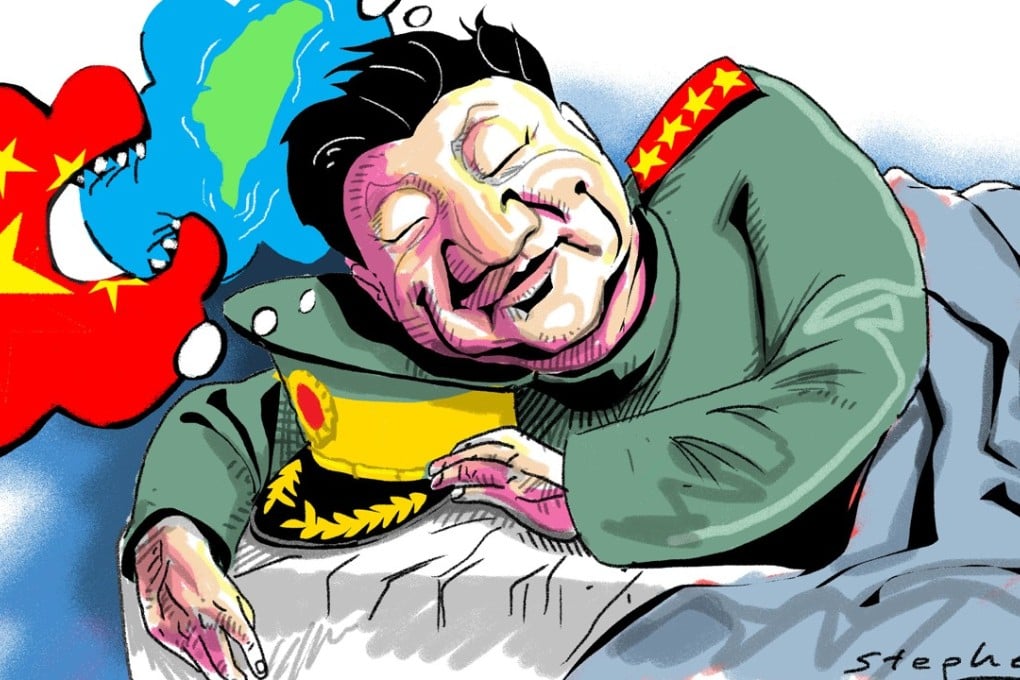Advertisement
Opinion | Why China will wait until 2030 to take back Taiwan – unless the island forces Xi Jinping’s hand
- Deng Yuwen says the trade war has set back China’s timetable for reunification with Taiwan. But for political and personal reasons, President Xi Jinping is likely to retake the island, by force if necessary, before he steps down around 2033
Reading Time:4 minutes
Why you can trust SCMP
91

With cross-strait relations deteriorating and the United States frequently playing the Taiwan card, there is a distinct possibility of a Chinese military takeover of Taiwan. I have said President Xi Jinping is likely to recover Taiwan in 2020, the 100th anniversary of the Chinese Communist Party. But I am reassessing the timetable in light of the US-China trade war.
Unless something very unexpected happens, the probability of China retaking Taiwan in 2020 is basically zero for now. In the next two to three years, the Chinese economy could go through a difficult period and Xi, dealing with the internal difficulties caused by the trade war, will have no time for anything else. Also, China’s military reform will not be complete by then, and there will still be a considerable gap between Chinese and US military capabilities. Although a takeover battle would be fought in China’s near seas, Xi would have to prevent it from escalating into a full-blown war. Therefore, there could be no attack on Taiwan unless he was absolutely certain of winning, and it would take time.
In my opinion, if Xi does retake Taiwan, it is most likely to be around 2030.
Retired US navy captain Jim Fanell also made this prediction at a US House of Representatives intelligence hearing this year. He said there would be increasing pressure from inside the Communist Party in the next decade to “pull the trigger” and recover Taiwan. Xi has declared he will achieve the “great rejuvenation of the Chinese nation” by 2049, the 100th anniversary of the People’s Republic of China, hence Fanell’s forecast that China will retake Taiwan in 2029. His reason was that the world’s leaders forgot about the June 4 incident in less than 20 years and “eagerly flocked to Beijing to attend the opening ceremony of the 2008 Olympic Games”. So, counting backwards from 2049, China would have to recover Taiwan in 2030 at the latest.
Advertisement
Although Fanell’s deduction about China’s timetable is somewhat far-fetched, his analysis of Beijing’s agenda – and of Xi’s ambition – is bang on. In theory, the realisation of Xi’s “Chinese dream” of national rejuvenation requires a series of indicators. However, if the two sides of the Taiwan Strait were still separate in 2049, it would be difficult to persuade the Chinese people that the Chinese dream had been realised, and Xi himself would be dissatisfied. How do you claim to have rejuvenated a nation when it is still split?
Advertisement
Xi is a nationalist and his Chinese dream includes complete reunification. Only by retaking Taiwan could Xi realise the dream; only by bringing off this immortal achievement could he surpass Mao Zedong in the historical narrative of the Communist Party. From this perspective, Taiwan is the most important element of Xi’s Chinese dream.
Besides, Xi has personal considerations to take into account. He has offended too many people during his anti-corruption campaign in recent years and, even if the party collapses, he might have difficulty making a safe landing. But if he could win back Taiwan and reunify the country, he would become a national hero with an unparalleled achievement under his belt, and no one would dare touch him.
Advertisement
Select Voice
Select Speed
1.00x
